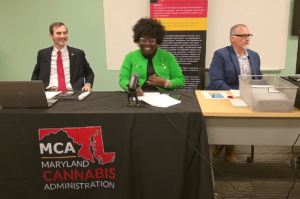The Maryland Cannabis Administration finally conducted its social equity adult-use lottery on March 14, completing 40 out of a previously planned 44 drawings.
“For those who were selected, look out for a communication in the coming days about next steps. For those not selected, you will also receive communication and we anticipate you will be eligible in the next lottery, which is not scheduled yet,” said MCA Director William Tilburg.

The lottery was supposed to be held by Jan. 1, according to law. But litigation and an avalanche of applications that needed to be reviewed for eligibility delayed the drawings until mid-March.
The state selected 70 standard dispensaries, eight micro-dispensaries, 16 standard growers, 24 micro-growers, 32 micro-processors and 24 standard processors.
No names were announced publicly. At the beginning of the live stream, a camera moved around the room, and the only people there were a production crew.
Lotteries for standard dispensaries in Talbot and Calvert were postponed, leaving 66 applicants waiting to see if they will get one of five licenses.
The social equity lottery is the first opportunity for new adult-use licenses after existing medical dispensaries were given the option of converting into hybrid models to jump start the state’s adult-use market.
Under the Cannabis Reform Act, social equity status requires 65% ownership from one or more individuals who have attended school or lived in disproportionately impacted areas in the states for five years, or attended a state university where at least 40% qualified for Pell Grants based on income.
The state received 1,708 applications. Of those, 1,515 met the minimum requirement for social equity status.
The state will designate winners as “selected applicants.” They will then be expected to submit additional information to the MCA so it can verify control and ownership of the prospective licensed company. This will be the last hurdle before the issuance of a license.
The lotteries were broken up into 40 separate drawings, with standard and micro-processors, standard and micro-growers, and micro-dispensaries split evenly between the state’s four regions. The MCA also selected lottery winners for standard dispensaries, which were split up between 20 of the state’s 24 counties.
Applicants who qualified for the lottery but were not selected will have their bids automatically rolled over into a non-social equity lottery, which is tentatively expected to take place this summer. That lottery was originally scheduled for May 1, but much like the social equity lotteries, it too has been delayed.
The drawings were conducted using Smartplay software during a three-hour live webcast. Brian Campbell, CPA and partner at Baker Tilly, served as auditor of the drawings.
Prior to the start, Tilburg noted there would be no drawings for general dispensaries in Kent and Somerset because the number of applications that qualified for both counties was equal to the number of available licenses. There were also no drawings for Calvert and Talbot, but there was no explanation given for their exclusions.
Talbot is involved in a lawsuit against the state, where an applicant claims they were unable to submit their application on time because the state’s website failed.
That lawsuit, KG Wellness #4 v. Maryland Cannabis Administration, was filed on Feb. 16 in the Circuit Court for Anne Arundel County. That case remains ongoing, and the plaintiff is seeking an injunction against the lottery drawing for Talbot County. The latest filing in the case was a motion of opposition from the state opposing the potential injunction.
The Maryland Hemp Coalition is also seeking to halt all licensing after winning an injunction on the requirement that hemp businesses need to be licensed. The Maryland attorney general has appealed the injunction ruling to the Appellate Court in Maryland in Wes Moore, et al. v. Maryland Hemp Coalition, et al., and the coalition has filed a motion to enjoin the state from issuing new recreational cannabis licenses.
Meanwhile, Justyna Jensen sued the state over the social equity qualifications, arguing that they were in violation of the U.S. Constitution’s dormant commerce clause. Jensen was also seeking an injunction against the lottery, but those efforts failed in late February with the lottery just weeks away.












